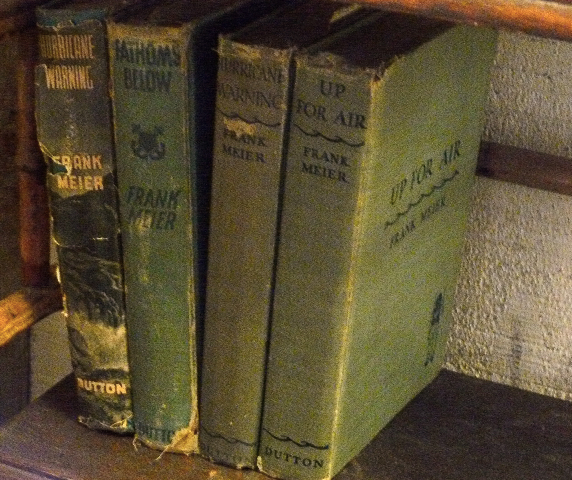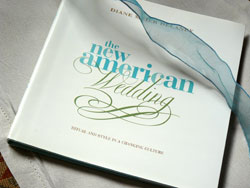Fathoms Below. But am I Writing?
Tuesday, November 17, 2009

Some of the books of my grandfather, the famous deep sea diver, broadcaster and author, Frank Meier.
My grandfather, Frank Meier, wrote books with the most wonderful titles: Hurricane Warning; Up For Air; Men Under the Sea; Women of the Sea; Fathoms Below. In them, he told the stories of his adventures, and of the storms and shipwrecks that took down the vessels he spent his life salvaging, as he earned his title, Master Diver of the World. Before Cousteau, Frank Meier was the most important deep-sea diver in the world, but his real fame came from the books he wrote, their serializations in The Saturday Evening Post and his weekly radio broadcasts, where he read those same stories, each week, on the air. Above all, I think it’s clear, that along with his knowledge of the deep, this man knew how to mine his own quarry.
My mother’s mother, on the other hand, never had the chance to realize her dreams; she died at the age of thirty three, in 1933. Along with the stories of her horses stabled in Central Park and her perfectly dressed townhouse on 52nd Street, it was said that at her death, she was planning on launching her own publishing company. At least that’s the legend as remembered by my mother, eleven years old at the time of that important death. Some legends are more true than truth; especially to a child who misses her mother. But there must have been something to the story, as the idea of having one’s own imprint seems an unlikely fantasy for a little girl.
Still, even with the romance and family history surrounding writing and publishing on both sides of the parental equation, I didn’t dream of becoming a professional writer; not as a child nor as a young woman. I didn’t take creative writing classes. I never joined a writing group. And if I were more identified with Jo March than any of the other Little Women, I was also hell bent on growing up to be like Amelia Earhart. Only not dead and lost at sea, I remember specifying. And I would fly only on weekends, my time-off from my real work as a doctor. A doctor who would save the lives of the handsomest boys in school, all of whom were headed for bouts of typhoid or rock climbing injuries that only I would know how to resolve. Maybe there was drama in my blood, after all.
Of course I wrote. So did you, even if we didn’t call it ‘writing’. I’ve always loved writing letters, I took to e-mail like a duck to water. And if, in my work, the constant, massive output of words that make up a life of marketing and business consultancy didn’t seem to add up to anything exquisite or rare, I enjoyed thinking through a client’s problems and outlining their solutions, equally enjoying the crafting of the papers that informed those positions.
I still enjoy writing copy and I’ve no intention of giving up my ‘day job’. I’ve loved the discipline of getting something large enough to cause an anticipated reaction in a real live person, down to the words that could fit into the tiny space available in an ad. I’ve loved thinking through the voices that might be most effective. Do they educate, scold, plead or inform? Do you hear the voice of your favorite teacher, your big crush or your best friend? Do you hear the voice of your own heart? What wonderful exercises. Are they somehow less than literature? They’re certainly shorter. And they actually have to work. They have to stick and inspire. In a way, they’re held to a higher order than art. But, ironically and all too often, if they’re not art, they probably won’t work. Can business writing afford to be less than inspiring? Less clear? Less compelling? I hardly think so.
And while it wasn’t technically business writing, when Kirkus or Publishers Weekly called The New American Wedding both “literary†and “indispensable†I was delighted. Literary! Imagine that, I thought. But did I think of myself as an author? I did not.

If I was not a natural writer, I was certainly a natural reader. Following an accident, when I was seven, I had a series of operations on my hand, which kept me from playing with other children for about a year. I may not have gotten much fresh air, but I read. I read every book in my parent’s houses and nearly every book in the school library. These libraries were dangerous places, they held all kinds of adult information. My fifth grade teacher found John O’Hara an inappropriate choice for a ten-year-old’s book report. Ten North Frederick was rejected and I was instructed to write a second report on Black Beauty. I’m still annoyed.
But I read everything – books, pamphlets, magazines, the labels on products, instructions in packages, and every magazine or newspaper that came to or near our home. I found I liked what became known as the New Journalism even more than books. The magazine of the New York Herald Tribune (to become New York Magazine some years later) was a Sunday treat from the time I was about eleven years old. It presented a new version of an adult world, much more exciting than the land of town-and-country clubs and the cardigan-sweatered Junior League served up by my parents. Each week my fashionable aunt would drop off her stack of Women’s Wear Daily issues, and I would inhale them, memorizing the names of the top models and the chicest boutiques and hanging on every word of Suzy’s gossip column. I was as delighted as my mother was dismayed to find that her hairdresser, decorator and butcher were all at the top of the WWD Most-Wanted list. In restaurants and shops all over town, I would point out Euro-trash countesses and effeminate dress designers to my horrified parents, calling them by name. “Don’t point,†they would hiss, but almost always followed by the completely bewildered query, “How do you know these people?â€
I knew them, as well as I knew the characters in John O’Hara’s fictional town of Gibbsville. I knew them through the pages of print that took on much more meaning than most of the neighbors and families who peopled my real life. I wanted to escape into those far more interesting, glamorous and salacious fictional lives than those I recognized ferrying between the Upper East Side of Manhattan and Morris County. But did I dream of creating such characters myself? I can’t say that I did.
Still, when it appeared, in my fifth decade, writing fiction came about as naturally as making a pot of tea. I had an idea for the story of The Season of Second Chances; a tale about two unlikely companions, outcasts, united by their emotional limits and facing the chance to change their lives – together or apart. I had the most encouraging cheerleader in Frank, to champion that idea into a commitment, and to direct me into its exercise. Not terribly different, I found to my pleasure, than the creation of a marketing campaign. Not terribly different than the hundreds of White Papers I’ve produced in my decades of work. But it is different, of course, in that it is, of all surprises, even more fun. Solitary, indulgent and delightful, if you can create characters with whom you look forward to spending time, people with ideas you long to explore and values you want to champion. They didn’t need to be real, but they were real enough for me. And I found I liked writing fiction. A lot.
I don’t know whether that’s what spurs on other writers. I don’t know whether Mellville always wanted to write, or if, when he did, he simply wanted to get to know a whale a little better. I think my grandfather wanted to tell his own stories, revisit the places and the times that gave him such success and energy. I don’t think it’s much of a stretch to imagine that when he was land-bound, he longed for the sea, and his writing brought it back to him, like a warm wave on an ocean of memory.
Maybe we all long to visit the places that originally inspired us, or brought us comfort or delight. They might be actual places – or perhaps they’re truly deeper regions, fathoms below our consciousness, where the idea of creativity – producing something in your own unique voice – called “literature†or not— is realized and allowed to surface on the sea that becomes your life.
